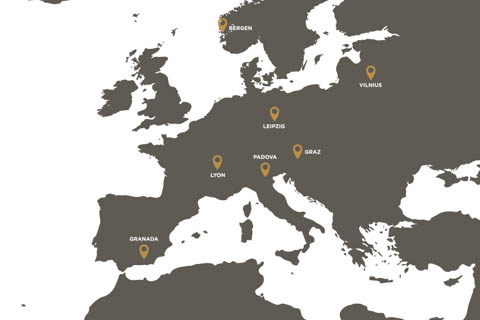 |
Faculty
Faculty of Physics |
|

|
Scope of studies and length
120 ECTS credits, 2 years |
|

|
Qualification awarded
Master in Engineering Sciences
|
|

|
Application deadline*
1 May / 1 July |
|

|
Language
English |
|

|
Tuition fee per year
6 100 € for non-EU students
5 538 € for EU students |
|

|
Start of studies
1 September
|
 |
City
Vilnius |
APPLY NOW
The aim of the programme is to train highly qualified, international standards meeting specialists who are able to understand, develop and integrate the latest technologies in the modern electronics and telecommunication industry, plan and organize their maintenance and renewal. The graduates will be capable to work in electronics and telecommunication companies as well as in scientific laboratories, implementing the latest scientific, technological and engineering achievements.
Programme structure
| Subjects of study |
Credits |
|
Semester 1 Autumn |
| Compulsory Courses |
25.0 |
| Digital System Analysis and Design |
5.0 |
| Information Systems and Their Components |
5.0 |
| Linux Embedded Systems Applications |
5.0 |
| Materials of Information Device Technology |
5.0 |
| Radio Link in the Mobile Telecommunication Systems |
5.0 |
| Optional Courses |
5.0 |
| Antenna Engineering |
5.0 |
| Applied Terahertz Physics |
5.0 |
|
Semester 2 Spring |
| Compulsory Courses |
30.0 |
| Applications of Distributed Computing to Telecommunication Network Modeling |
5.0 |
| Microcontrollers in Embedded Systems |
5.0 |
| Nanoelectronics |
5.0 |
| Optoelectronic Devices in the Telecommunications |
5.0 |
| Scientific Research Work I/II p. |
10.0 |
|
Semester 3 Autumn |
| Compulsory Courses |
25.0 |
| Applied Electrodynamics |
5.0 |
| Microwave Electronics |
5.0 |
| Scientific Research Work II/II p. |
15.0 |
| Optional Courses |
5.0 |
| Artificial Intelligence |
5.0 |
| The Modeling of Wireless Channel |
5.0 |
|
Semester 4 Spring |
| Compulsory Courses |
30.0 |
| Master Final Thesis (Study field: Electronic Engineering) |
30.0 |
Key Learning Outcomes
Graduates of the Electronics and Telecommunications Technologies will gain fundamental knowledge of complex processes and their analysis, as well as an understanding of theoretical knowledge application possibilities in the fields of electronics and telecommunications.
They will become highly qualified professionals who:
- are capable of independently modelling, testing, and integrating current and future telecommunication systems, as well as planning and organizing their renewal and development;
- know how to operate specialized telecommunication network equipment and devices operating in the ultra-high frequency domain;
- can model technical parameters of wireless networks;
- will develop and improve embedded microcontroller systems and integrate them into the existing electronic infrastructures;
- understand the operating principles and essential properties of modern IT materials and sensors and their application;
- are prepared to create state-of-the-art technologies for the quick-changing telecommunications and electronics market.
Programme Specific Requirements
- Completed university bachelor’s degree studies in the physics field of the physical sciences study field group or the materials technology field of the technological sciences study field group or electronics engineering field of the engineering sciences study field group or other studies closely related to the aforementioned fields;
- In the diploma supplement: No less than 60 per cent of the volume of course units taken shall be in the fields of physics, mathematics, electronics, telecommunications, engineering, technological sciences; the cumulative grade point average of these course units shall be no less than 60 per cent of the maximum possible grade; all course units must be passed (positively assessed); additional points shall be awarded for scientific publications supported by bibliographic links and presentations in scientific conferences in the fields related with the study programme.
- The candidates meeting the aforementioned criteria are invited to the remote motivational interview. During the interview, the candidate’s determination to study in a master’s degree programme based on science is evaluated. If the interview is evaluated negatively, the candidate is not admitted to the study programme.
In addition, all applicants have to fulfil the general admission requirements.
Why choose this programme?
- The programme provides essential knowledge in electronics, physics, telecommunication systems, mathematics, and programming.
- Strong emphasis is placed on microelectronics, solid-state electronics, and telecommunications. Students improve their systems programming and big data analysis skills.
- Students gain practical experience with software commonly used in the job market for designing telecommunication networks and integrated circuits.
- It encourages student independence. A flexible study schedule allows for growth not only academically but also professionally.
- Graduates obtain an engineering education in electronics.
|
What comes after?
|


